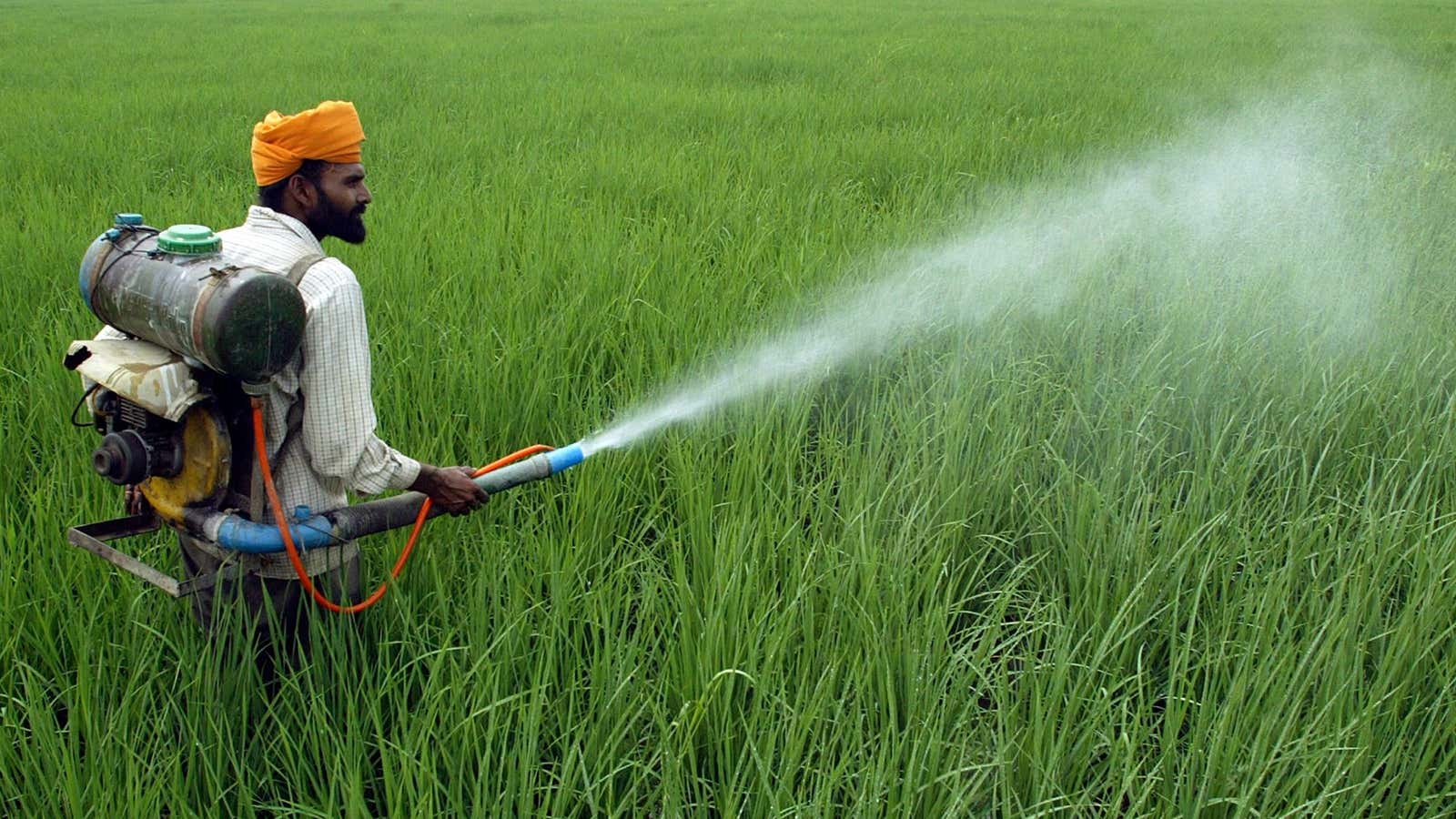A newly developed gel capable of neutralising toxic pesticides is the first real protection that India’s farmers have against toxic chemicals that are indiscriminately sprayed on crops in the near absence of government controls.
Last month (October), researchers at the Institute for Stem Cell Biology and Regenerative Medicine (InStem), Bengaluru, published in Science Advances the results of their work in developing a poly-Oxime gel that rapidly deactivates several pesticides, including organophosphates.
Worldwide, some 200,000 people die from exposure to organophosphates. Like war chemicals, organophosphates inhibit neurotransmission mechanisms, leading to neurological disorders, suffocation, paralysis, and death, the study says.
Farmers are supposed to wear thick plastic protective equipment while spraying, but this is costly and impractical in India’s hot and humid climate. This situation prompted the researchers to develop a gel using polymers from crustacean shells—a by-product of the seafood industry—that has been proven to detoxify most pesticides used in India.
Tests on rats showed the gel providing 100% protection when exposed to a series of doses that killed unprotected rats in just five days. The researchers have created a start-up to commercialise the active ingredient which can be used to treat lightweight cotton clothing and masks. Human trials may start by next year.
“Until toxic pesticides are banned, farmers can use them (treated clothing and masks),” says Praveen Kumar Vemula, assistant professor at InStem and an author of the study.
Lax regulation
Regulation of permitted pesticides is lax, says Amit Khurana, programme manager for food safety and toxins at the Centre for Science and Environment, New Delhi. Pesticides registered by the government carry no guidelines on safe residue levels and monitoring is almost non-existent, he says.
The result is that pesticide poisoning kills scores of Indian farmers every year due to an overuse of toxic formulas banned in other countries. Last year, between September and November, 21 farmers in the Yavatmal district of Maharashtra state died of suspected poisoning by monochrotophos—an organophosphate pesticide banned in more than 60 countries, including Cambodia, Indonesia, the Philippines, Sri Lanka, Thailand, and Vietnam.
A government review recommended in 2015 the ban of 18 pesticides but this was only enacted in August. The ban excluded several pesticides prohibited or heavily restricted in the developed world like monochrotopos.
Vemula expects farmers to continue using toxic pesticides until they are presented with viable alternatives. “Their priority is to protect their crops rather than themselves,” he says, adding that the aim of his team is to protect farmers until toxic pesticides are banned or strictly regulated.
Farm labourers are at greatest risk because they carry out the task of spraying crops manually. The reported poisonings may only be tip of the iceberg, says Suresh Babu, head of capacity strengthening at the International Food Policy Research Institute.
“It’s a huge problem. And it’s not just the choice of pesticides; it’s the quantity used and the methods by which they’re used,” says Babu.
Kavitha Kuruganti, national convenor of the Alliance for Sustainable and Holistic Agriculture, worries that solutions that only tackle the poisonings could mask deeper healthand environmental impacts from excessive pesticide use. “Chronic impacts are difficult to establish but they exist and focusing mainly on acute poisonings doesn’t help,” she says.
Low awareness
Perhaps the biggest barrier to solving the crisis is a lack of education on the proper use of pesticides and safer alternatives. A severely under-resourced agricultural extension system has allowed dealers with little training and obvious interests in encouraging overuse to become farmers’ advisors, says Babu.
Resolving that information gap is an essential first step, says Kuruganti. “Just policy level action without programmatic establishment of alternatives will not work,” she says. “We need a proper phasing out plan which has grassroots support from farmers.”
This piece was originally published on SciDev.Net: news, views and information about science, technology, and development, under a CC BY 2.0 license. We welcome your comments at ideas.india@qz.com.
